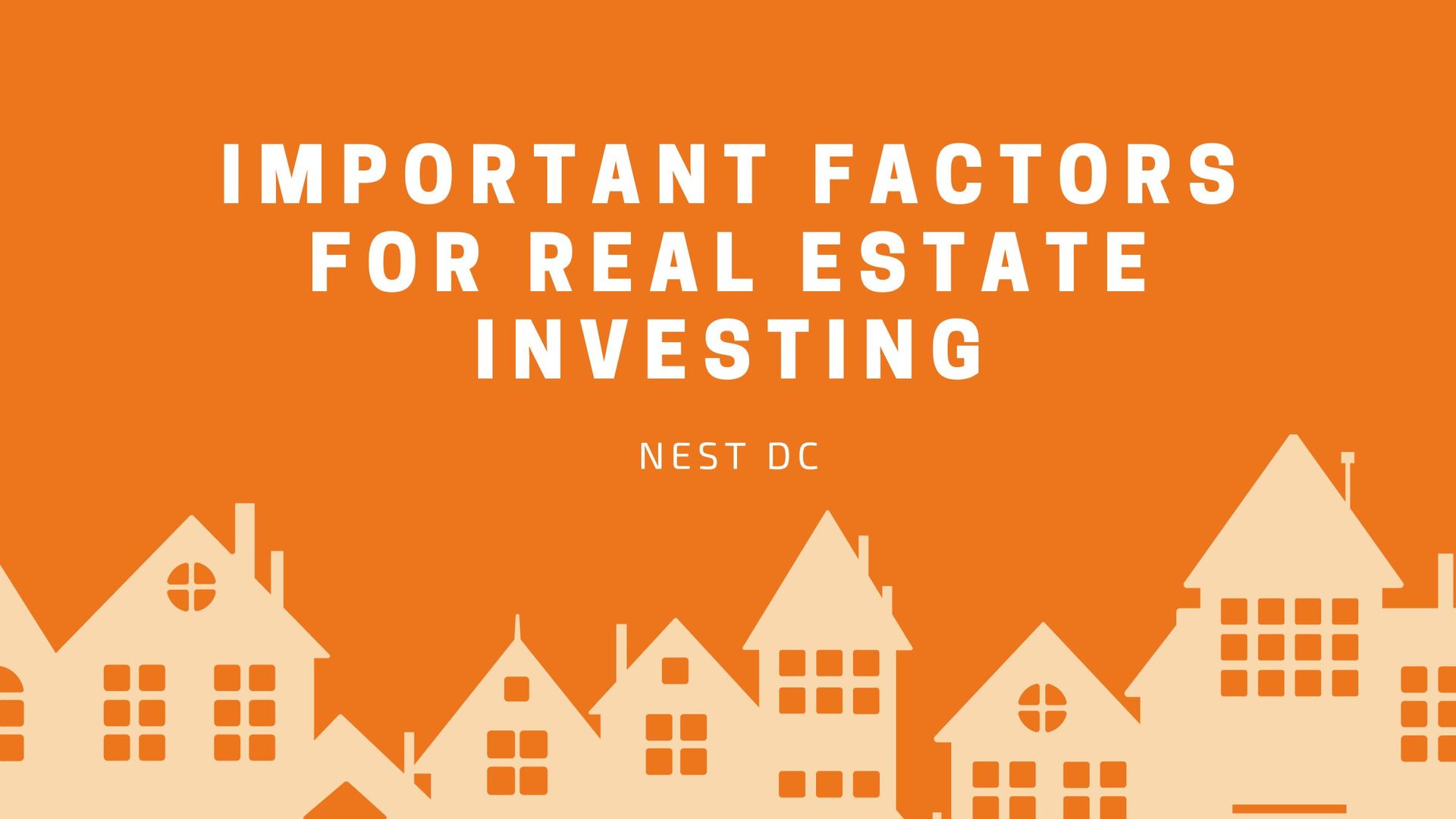Important Factors for Real Estate Investing
Nest DC

Real estate investment is a dynamic and potentially rewarding venture. Whether you're a seasoned housing provider or just starting your property investment journey, understanding the key factors that can make or break your success is crucial.
By the end of this article, you'll be better equipped to make informed decisions and maximize your returns in the real estate market. Here are the facts you need to consider.
Location, Location, Location
One of the cardinal rules in real estate investing is the significance of location. The location of your property directly impacts its rental income, property value, and tenant quality. Consider the following factors when evaluating a potential investment location:
- Proximity to Amenities: Properties near schools, parks, shopping centers, and public transportation tend to attract more tenants.
- Economic Stability: Research the economic prospects of the area. A stable job market and growing industries can translate to higher demand for rental properties. Washington, DC is fortunate to be fairly stable overall.
- Safety and Crime Rates: Safety is a paramount concern for tenants. Low crime rates can command higher rents and attract quality tenants. No matter the neighborhood, residents appreciate when property owners install additional security measures.
- Future Developments: Keep an eye on upcoming infrastructure projects, developments, and gentrification efforts that can influence property values.
Property Type and Condition
The type and condition of your investment property play a pivotal role in your success as a housing provider.
Property Type: Determine whether you want to invest in single-family homes, multi-unit properties, or commercial real estate. Each has its unique advantages and considerations.

Property Condition: A well-maintained property will save you money in the long run. Regular inspections, maintenance, and renovations are essential to keep your property in excellent condition and attractive to tenants.
Investment Strategy
Your investment strategy should align with your financial goals and risk tolerance. Common investment strategies include:
- Buy and Hold: Purchase properties for long-term rental income and potential appreciation.
- Fix and Flip: Buy distressed properties, renovate them, and sell at a profit.
- Short-Term Rentals: Washington, DC has a robust market for corporate rentals. Consider working with a company that specializes in their management.
- Commercial Real Estate: Explore opportunities in commercial properties, such as office spaces or retail.
Financing and Budgeting
Before making an investment, it's essential to establish a clear financial plan. Consider the following financial factors:
- Mortgage Financing: Assess your borrowing capacity and secure financing with favorable terms.
- Budgeting: Create a comprehensive budget that includes the purchase price, closing costs, renovation expenses, and ongoing operating costs.
- Contingency Funds: Set aside emergency funds to cover unexpected maintenance or vacancy periods.
Market Research and Analysis
Thorough market research and analysis are crucial for making informed investment decisions. Study the local real estate market to understand trends, demand, and competition.
- Comparative Market Analysis (CMA): Conduct a CMA to assess property values and rental rates in the area.
- Rent vs. Buy Analysis: Determine whether buying or renting a property in a particular area is more financially advantageous.
- Vacancy Rates: High vacancy rates can be a red flag for investors. Research the vacancy rates in the neighborhood to gauge demand.

Tenant Screening and Retention
Securing reliable tenants and retaining them is key to a profitable real estate investment.
- Tenant Screening: Implement a rigorous tenant screening process that includes background checks, credit checks, and rental history verification.
- Lease Agreements: Create comprehensive lease agreements that outline terms, responsibilities, and consequences.
- Tenant Retention: Maintain open communication with tenants, respond promptly to maintenance requests, and foster a positive tenant-housing provider relationship to encourage tenant retention.
Legal and Regulatory Compliance
Compliance with local, state, and federal laws is essential to protect your investment and avoid legal issues. Be well-versed in landlord-tenant laws, fair housing regulations, and property maintenance codes.
- Property Inspections: Regular property inspections help ensure compliance with safety and habitability standards.
- Lease Agreement Compliance: Ensure that your lease agreements adhere to all relevant laws and regulations.
- Eviction Procedures: Be familiar with the legal process for evicting tenants if necessary, and always act within the bounds of the law.
Property Management
Effective property management is critical for housing providers. You can choose to manage your properties yourself or hire a professional property management company to handle day-to-day operations. Key property management tasks include:
- Tenant Placement: Advertising, screening, and placing tenants.
- Maintenance: Scheduling and overseeing property maintenance and repairs.
- Rent Collection: Managing rent collection and handling late payments.
- Legal Matters: Addressing legal issues, disputes, and evictions when necessary.
- Reporting: Maintaining accurate financial records and providing regular reports to investors.

Insurance and Risk Mitigation
Protect your investment and assets by having the right insurance coverage in place. Consider housing provider insurance, liability insurance, and umbrella policies to safeguard against unforeseen events like property damage, liability claims, or natural disasters.
Networking and Education
Networking with other real estate investors and staying updated with industry trends and best practices can provide invaluable insights. We highly recommend becoming a NARPM member.
Attend real estate seminars, join local real estate associations, and engage in online forums to broaden your knowledge and stay connected with professionals in the field.
Exit Strategy
Plan your exit strategy from the outset. Whether you intend to sell the property for profit, pass it down to heirs, or hold it for long-term rental income, knowing your ultimate goal helps you make strategic decisions along the way.
Bottom Line
Becoming a successful real estate investor and housing provider requires a combination of knowledge, careful planning, and continuous learning. Remember, real estate investing is a long-term journey, and by investing wisely, you can build a profitable and sustainable real estate portfolio. Partner with
Nest DC to make your real estate investing journey a breeze!









